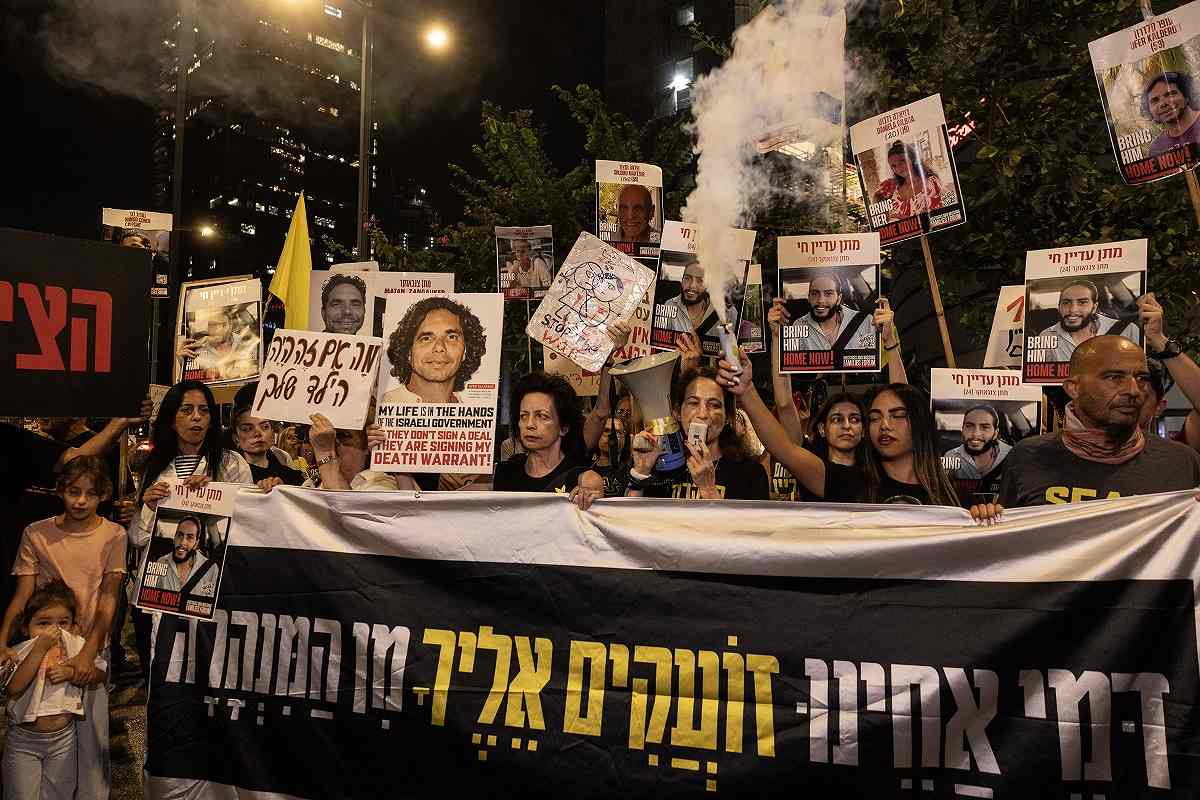
Demonstrators call for an immediate cease-fire and hostage deal in Tel Aviv on Thursday.
14:05 JST, October 18, 2024
RAMALLAH – Few Palestinian leaders had gained a reputation like Yahya Sinwar’s. He was at once a ruthless militant leader hunted by Israel and a man many Palestinians saw as an ardent defender of their cause.
His death in a firefight in the Gaza Strip on Wednesday – news of which was leaked and then confirmed Thursday – was a triumph for the Israeli military, but also held symbolic significance in a grinding year-long war that has killed more than 42,000 Palestinians.
“It is the greatest achievement of Israel since the beginning of the war,” said Michael Milshtein, a former head of Palestinian civilian affairs for the Israeli military. “But we shouldn’t get into euphoria, and we shouldn’t forget the war is not over.”
For Hamas, the militant group that Sinwar led, his loss is a serious setback, analysts said, but it probably won’t be a death knell for the movement or bring an immediate end to the bloodshed.
The group, which is both a political and military force, has survived the assassinations of multiple leaders over the decades – its staying power a testament to the depth of anger and disillusionment among Palestinians over Israel’s occupation and the repeated failure of U.S.-sponsored peace talks.
Sinwar, 61, was seen by many Palestinians and “millions of Arabs and Muslims” as “an iconic figure who dared to stand up and defy Israel,” said Fawaz Gerges, professor of international relations at the London School of Economics. His death is a “painful and heavy blow for Hamas,” he said.
Still, “this fight is not about one person or one leader,” Gerges added. “Israel will find itself in the same place in the morning after it declared that Sinwar is dead. It does not really resolve Israel’s strategic predicament.”
Israel’s military campaign in Gaza began more than a year ago after Hamas-led fighters attacked Israeli communities Oct. 7, 2023, killing about 1,200 people. It has laid waste to much of the enclave and severely degraded Hamas’s military capabilities to the point where “Hamas today cannot attack Israel,” said Yaakov Amidror, a former major general and Israeli national security adviser.
But Hamas has morphed into a potent guerrilla force, continuing to engage in fierce street battles with Israeli troops inside Gaza. It also still holds 101 Israeli hostages – several dozen of whom are believed to still be alive – and remains strong enough to “kill any substitute” in a postwar scenario, Amidror said.
“It’s not going to be the end of Hamas,” Mkhaimar Abusada, a political science professor at Al-Azhar University in Gaza, said of Sinwar’s death. Abusada fled Gaza last year and is now a visiting scholar at Northwestern University.
Israel assassinated the group’s founder, Sheikh Ahmed Yassin, and then-leader Abdel Aziz Rantisi in 2004, but those killings did not weaken Hamas, he said.
“Hamas, at the end of the day, look at themselves as a national liberation movement, that they are fighting against the Israeli occupation,” Abusada said. “And if one leader dies, another one will pick up the fight and continue. This is what has been going on for many years.”
Sinwar spent 22 years in Israeli jails before his release in a 2011 prisoner exchange for captured Israeli soldier, Gilad Shalit. He built a reputation as an unyielding ideologue and a brutal enforcer of Hamas rule before becoming the group’s leader in Gaza in 2017.
There, he plotted the Oct. 7, 2023, attack, a harrowing rampage across southern Israel that he hoped would ignite a regional war. While other Hamas leaders led comfortable lives abroad in Turkey, Lebanon and Qatar, Sinwar stayed in besieged Gaza and disappeared after Oct. 7 into the vast network of tunnels Hamas had built underneath it.
For a year, as Israeli forces pummeled and then invaded the territory, displacing most of the population and causing acute hunger and a humanitarian crisis, Sinwar managed to survive and maintain his grip both on Hamas forces inside Gaza and its leadership abroad as they negotiated cease-fire talks, analysts said.
He consolidated control over the summer, rising to lead Hamas’s political bureau after the assassination of the group’s chairman and chief negotiator, Ismail Haniyeh, in Tehran.
But just two months later, his reign ended in a pile of rubble in Rafah in southern Gaza, his body caked in dust and his head mortally wounded after encountering Israeli forces, according to photos apparently taken by soldiers and circulated online. Later, Israeli authorities said DNA tests and dental records confirmed that Sinwar was dead. Hamas did not respond to the reports that he was killed.
The images posted online Thursday, in which Sinwar is wearing a tactical vest, could increase support for Hamas, allowing it to burnish his image as a fighter and martyr for their cause. Israel repeatedly sought to portray him as a cowardly leader who hid underground as Palestinians were killed.
The military on Thursday released what it said was drone footage of some of Sinwar’s final moments: He is wounded, sitting in a chair in a destroyed home, his face hidden by a scarf. He stares down the drone as it approaches and throws a piece of wood at the unmanned aircraft.
“It marks a heroic end for a brave man, especially since he was martyred on the front lines alongside his soldiers,” said Ibrahim Madhoun, a Turkey-based Palestinian political analyst close to Hamas.
For Mohammad Abu Ghali, 27, who is living in a tent in Khan Younis after being displaced during the war, the circumstances of Sinwar’s death prove “he never laid down his weapon. He wasn’t hiding in tents or a tunnel as the occupation often claimed.”
“His death is a source of pride for all Palestinians,” he added. “This is not a victory for Israel.”
Madhoun said Hamas would continue its fight on the battlefield, blaming Israeli Prime Minister Benjamin Netanyahu for tanking attempts to reach a truce agreement.
But opposition to Hamas inside Gaza has grown as the war drags on. Most civilians are displaced, hungry and bone-tired from a year of living in what U.N. officials have described as “hell on earth.”
“I am neither happy nor sad, but I hope that if his death is real, it will lead to the end of the war,” said Abeer Ghousain, 27, from the Nuseirat refugee camp in central Gaza, as buzz about Sinwar’s possible death began to circulate online Thursday.
That will depend in part on who replaces Sinwar, who became a larger-than-life figure – “one of the prominent leaders of Palestinian history but also one which is the dominant – actually, the only – decision-maker regarding the war,” Milshtein said.
Sinwar’s brother, Mohammed, will probably take over his elder sibling’s military role in Gaza, analysts said, but he isn’t seen as having political potential.
The movement may opt not to announce its next political leader “for security reasons,” Madhoun said. Or it could follow the standard process of convening its shura council – a secretive consultative body elected by Hamas members in Gaza, the West Bank, the diaspora and Israeli jails – to vote on a new chief.
Sinwar’s successor will probably be based abroad, Madhoun said. Khaled Meshal, who led Hamas for two decades until 2017, could reprise the role, Abusada said. Meshal currently heads Hamas’s political bureau in the diaspora that is based out of Doha, Qatar. Khalil al-Hayya, Sinwar’s deputy who is also now in Qatar, is widely seen as another possible replacement.
“Those people, the outside leadership, are more flexible than Sinwar,” Milshtein said. Qatar, their host; Egypt, another key interlocutor in negotiations between Israel and Hamas; and the United States could put more pressure on these figures to reach a cease-fire agreement, he added.
But Netanyahu vowed Thursday to continue the war.
“We cannot really expect or even dream that there will be a total collapse” of Hamas, Milshtein said. If Netanyahu doesn’t seize the moment to reach a deal, he added, “it seems that unfortunately, the war of attrition in Gaza will continue, even after Sinwar is dead.”
Top Articles in News Services
-

Survey Shows False Election Info Perceived as True
-

Hong Kong Ex-Publisher Jimmy Lai’s Sentence Raises International Outcry as China Defends It
-

Japan’s Nikkei Stock Average Touches 58,000 as Yen, Jgbs Rally on Election Fallout (UPDATE 1)
-

Japan’s Nikkei Stock Average Falls as US-Iran Tensions Unsettle Investors (UPDATE 1)
-

Trump Names Former Federal Reserve Governor Warsh as the Next Fed Chair, Replacing Powell
JN ACCESS RANKING
-

Producer Behind Pop Group XG Arrested for Cocaine Possession
-

Japan PM Takaichi’s Cabinet Resigns en Masse
-

Man Infected with Measles Reportedly Dined at Restaurant in Tokyo Station
-

Israeli Ambassador to Japan Speaks about Japan’s Role in the Reconstruction of Gaza
-

Videos Plagiarized, Reposted with False Subtitles Claiming ‘Ryukyu Belongs to China’; Anti-China False Information Also Posted in Japan























